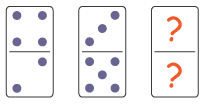Math word problems can be very challenging.
(But we have brilliant word problem materials containing a lot of worded problems of course, just click here!)
Math word problems are what math is all about: the ability to solve problems. Word problems describe real-life math applications and make math meaningful. It seems, unfortunately, that many students struggle with these word problems. Why is this? Is it because of the underlying math concepts or are reading skills the obstacle?
Math word problems require both math skills and academic reading skills. Many students have difficulties in 'reading for understanding' and will, consequently, struggle in solving math word problems. This is especially the case in an ESL environment.
There are millions of non-native English speaking students around the world who are studying math in English. For these students, even simple problems can become hard to comprehend. For math teachers in the ESL industry, or in English Programs around the world, word problems form the biggest teaching challenge.
So how can we teach the application of math (word problems) to let's say a Chinese or Mexican student who's struggling with English? Or to any ESL student for that matter? Should we teach these worded math problems at all?
Yes we should. Without word problems, math will only be numbers and operations and most students will never understand why they are studying it. Math needs to be meaningful and students need to know how they can use it in their daily life's environment.
What can teachers do in this catch 22 situation in which both math and English skills are required? First of all we need to look
very critically at our math content and especially our math books. Most word problems can be simplified in terms of vocabulary. Teachers can
easily re-write problems and use situations and words that the students are familiar with. A Chinese student will understand problems involving Chinese New Year better than those based on Thanksgiving's Day! The latter has no meaning for the students and would make a math problem unnecessary difficult.
Furthermore, teachers can (need to):
-avoid culturally biased word problems
-use cooperative learning strategies
-have students write their own word problems (as a check for understanding)
-use video material, presentations, theatre play
-create material in which students have to fill in the gaps.
Especially this last point is very effective. Teachers can make work sheets with word problems and have students fill in the names, nouns or numbers. Many students (try to) solve word problems by guessing the operations. By leaving information out of a word problems students will be tuned in and actively trying to solve the problem.
On MathinEnglish we offer many worksheets based on these principles. We keep the language and grammar simple, use simple situations, use words that (ESL) students know and use the fill-in-the-gap structure. We also promote that after studying a set of word problems, students create their own problems. By doing this teachers can check for understanding.





